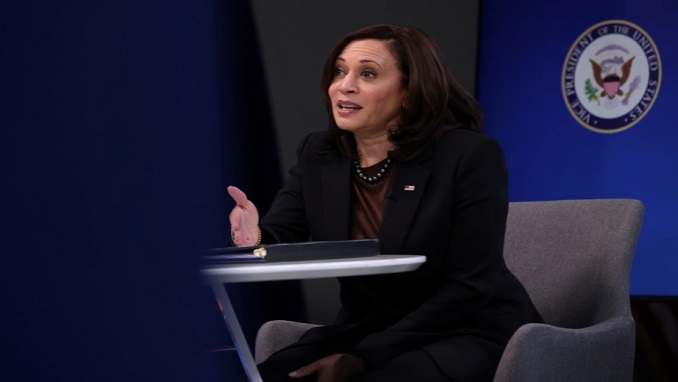US Vice President Kamala Harris, in a call with Israeli Prime Minister Benjamin Netanyahu has reaffirmed the United States’s opposition to an International Criminal Court (ICC) investigation into possible war crimes in the Palestinian territories, the White House said as quoted by Al Jazeera.
During Thursday’s call, Harris and Netanyahu noted their governments’ “opposition to the International Criminal Court’s attempts to exercise its jurisdiction over Israeli personnel,” the White House said. A day earlier, US Secretary of State Antony Blinken also said that Washington “firmly opposes and is deeply disappointed” by the ICC decision.
“Israel is not a party to the ICC and has not consented to the Court’s jurisdiction, and we have serious concerns about the ICC’s attempts to exercise its jurisdiction over Israeli personnel,” Blinken said in a statement.
Harris and Netanyahu also agreed to continue to cooperate on regional security issues, specifically Iran’s nuclear programme and its “dangerous” behaviour, the White House statement said. Harris “emphasised the United States’ unwavering commitment to Israel’s security,” the statement added.
Biden’s bid to revive a 2015 nuclear agreement between Iran and world powers, however, sets him and Netanyahu on a potential collision course. The Israeli prime minister opposed the nuclear deal and had applauded former President Donald Trump’s decision to abandon it in 2018.
The call, the first between the two since Harris and President Joe Biden took office in January, followed the ICC’s announcement of the investigation on Wednesday.
The court determined in February that the occupied Palestinian territories fall under its jurisdiction, paving the way for an investigation of war crimes committed by Palestinians and Israelis. Chief Prosecutor Fatou Bensouda has promised the inquiry will be conducted “independently, impartially and objectively, without fear or favour”.
Bensouda, who will be replaced by British prosecutor Karim Khan on June 16, said in December 2019 that war crimes had been or were being committed in the West Bank and Gaza Strip.
In a statement issued on Wednesday, Ms Bensouda explained that her office was obliged to act “where a state party has referred a situation” to it and “it is determined that a reasonable basis exists to commence an investigation”.
Ms Bensouda said she had carried out a “painstaking preliminary examination” that lasted close to five years and promised that the investigation would be conducted independently, impartially and objectively, without fear or favour.
“We have no agenda other than to meet our statutory duties under the Rome Statute with professional integrity. In the current situation, however, there is a reasonable basis to proceed and there are admissible potential cases,” she said, noting that she had declined to investigate the 2010 killing by Israeli troops of 10 Turkish activists on the Gaza-bound ship Mavi Marmara.
Israel has never ratified the Rome Statute, but the court ruled that it had jurisdiction because the United Nations secretary general accepted the Palestinians’ accession to the treaty in 2015.
Meanwhile, Amnesty International has welcomed the International Criminal Court (ICC) decision to open an investigation into serious crimes under international law alleged to have been committed in the Occupied Palestinian Territories.
Describing this as “a momentous breakthrough for justice after decades of non-accountability for war crimes and crimes against humanity,” the head of Amnesty International’s Centre for International Justice, Matthew Cannock, added:
“The ICC investigation provides the first genuine prospect for thousands of victims of crimes under international law to gain long overdue access to justice, truth and reparations. It also offers a historic opportunity to finally put an end to the pervasive impunity that has driven serious violations in the Occupied Palestinian Territories for more than half a century.”
The Amnesty statement said that the decision sends a clear message to all perpetrators of crimes under international law in the OPT that they shall not escape justice.
Cannock called on the world’s governments to provide full political and practical support for the ICC in its investigation. He also called on the ICC to initiate contact with the affected communities immediately.
